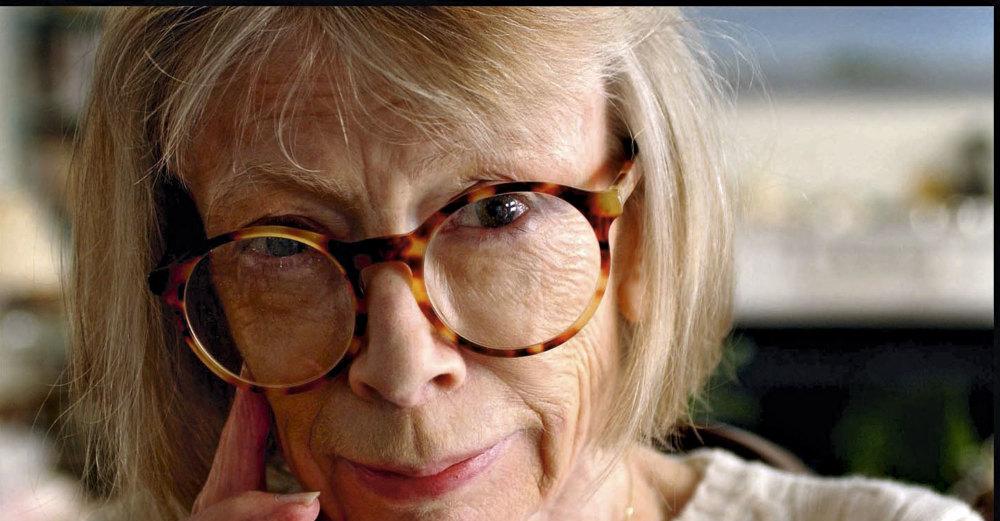
American literary figure Joan Didion passed away on December 23, 2021, at the age of 87. (Infographic/Figure)
In August 2005, Joan Didion, a giant in American literature who was a critic, novelist, journalist and screenwriter, was traveling through the state to promote her new book "The Year of Magical Thinking", about her deceased husband and sick daughter, when she suddenly received news of her daughter's death. Asked if she would rewrite the book, she replied coldly: It's finished. She won't rewrite it, because her daughter's death will be the subject of her next book. Six years later, she wrote Blue Nights, which the New York Times commented on as "an exploration and reflection on the loss of all, the passage of time, and the rapid decay of life, both melancholy and passionately." (a searing inquiry into loss and a melancholy meditation on mortality and time)
Nietzsche, a German philosopher with superhuman will, said, "What doesn't kill you make you stronger," meaning that as long as we can survive it, all the blows will become irrigation. For writers, as long as they keep writing, all misfortunes will eventually become inspiration and subject matter (What doesn't kill them make them better writers), and the recently deceased Didion is the best example.
Born in 1934, Didion, who had become famous in the 1960s, was a master writer of the so-called "New Journalism", specializing in investigative reporting in the literary style of scene description, detailed dialogue, special attention to detail and character psychology. Like the critic and feature writer Janet Malcolm of her year, Didion was more sensitive and analytical than ordinary about the deceptiveness of the story. In her view, people will always construct a "narrative" unconsciously or half-knowingly to explain the public events they witness or participate in. Her most discerning and insightful early essays were these kinds of "narratives about narratives," such as the so-called "The Central Park Five, which was unjustly imprisoned," or the presidential campaign of Massachusetts Gov. Michael Dukakis.
Unlike Malcolm, who has a natural writing style, Didion is a "control freak" who writes. She says she has little interest in "spontaneous and spontaneous", and pursues "I'm not much interested in spontaneity". What concerns me is total control)。 As a result, like an actor who gives us too much acting, Didion becomes a writer who gives us too much writing. Consider her famous sentence: "A place belongs forever to whoever claims it hardest. (Whoever claims to have a place in the loudest voice will always belong to him.)
It's a near-perfect sentence, but Didion, the "writer," couldn't see it at that, and the sentence turned into a nagging sentence: "A place belongs forever to whoever claims it hardest, remembers it most obsessively, wrenches it from itself, shapes it, renders it, loves it so radically that he remakes it in his own image. The British novelist Zadie Smith wrote a eulogy for Didion in The New Yorker, saying that "even if you disagree with her, you will be impressed by her sentences." (You didn't have to agree with her, but you had to submit to her sentences) Usually, I'm convinced by half or a third of her sentence and want to "return to sender" for the rest.
"Year of Fantasy" Chinese edition, the original English version of the book shadow. (Infographic/Figure)
Until "The Year of Fantasy", Didion, who was 71 years old, suddenly washed away the lead and returned to the truth. This book pioneered the genre of "grief memoirs," with a clarity that follows extreme pain. Zhang Ailing would say that it is "bitter and bright wisdom", in Didion's own words, "hard sweet wisdom". Grief turns out to be a place none of us know until we reach it that it is reminiscent of W.B. Yeats) lamentable "O who could have foretold/that the heart grows old." (Who can predict / feelings will eventually grow old).
Henry James, a novelist known as a master, has said that a writer is someone on whom nothing is lost. That's true, but it's not comprehensive enough. The so-called writer is someone to whom nothing is useless, including misfortunes and tragedies that happen to oneself or others. A writer of such a progression as Didion naturally understands the three tastes of this sentence.
A few years ago, Netflix had a documentary called "The Center Will Not Hold" about Didion's life. One scene mentions her visiting a five-year-old girl who likes to read comics, wear white lipstick, and be fed psychedelics by her mother in Los Angeles, on the verge of losing control in the 1960s. This human tragedy was a gift from Heaven to Didion, and when asked about forty years later about this girl, her eyes still lit up and she said excitedly, "Honestly, this is amazing." For the writer, this is a dream moment. ”(Let me tell you, it was gold. You live for moments like this if you're doing a piece)。
This is not insensitivity but a keen sense of touch. In first-class writing, whether it is creating, commenting or reporting on literature, readers can see and even be stunned, in addition to the author's talent, but also her mental toughness. With a cold and fiery gaze, Didion gazed at the blurring of flesh and blood and the fragmentation of life in reality. Even when writing about the people she loves and the things that hurt the most, her calmness, sobriety, and insight have not diminished. In Year of Whimsy, she tells readers with a slightly bitter sense of pride that her husband's doctor says she is a cool customer. In the documentary, she says to the camera: "I don't know what falling in love is, it's out of place with my world." ”(I don't know what falling in love means. It's not part of my world)。
Lin Peili